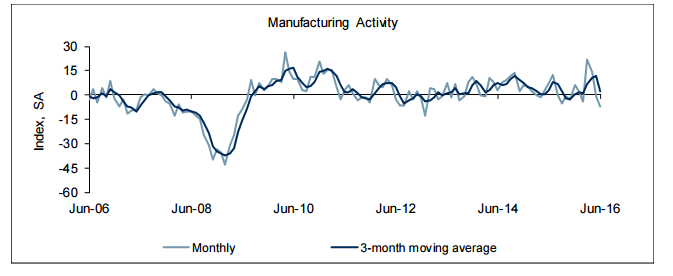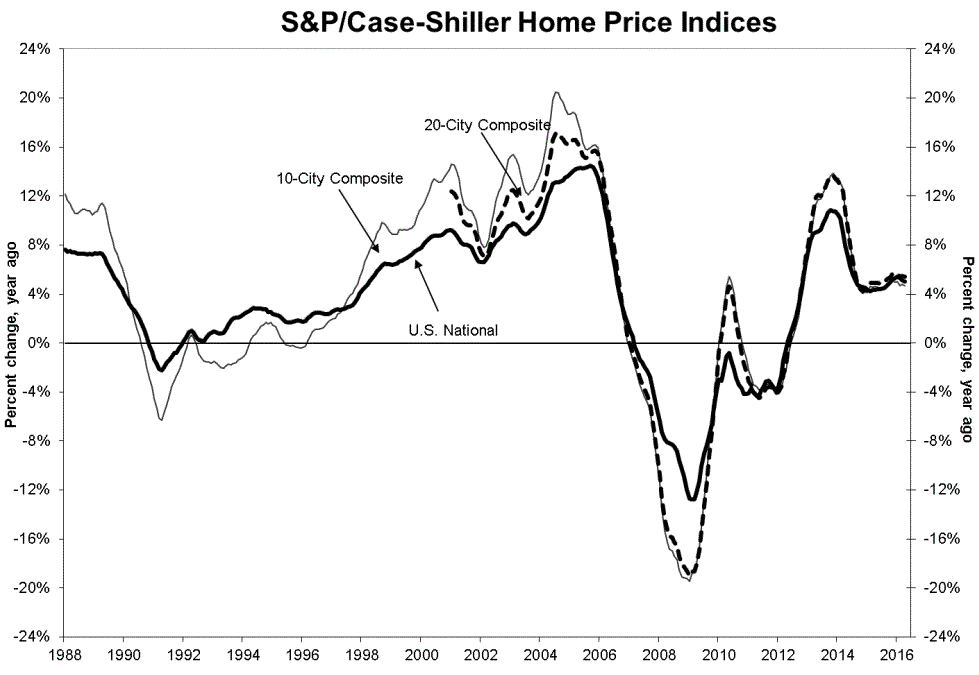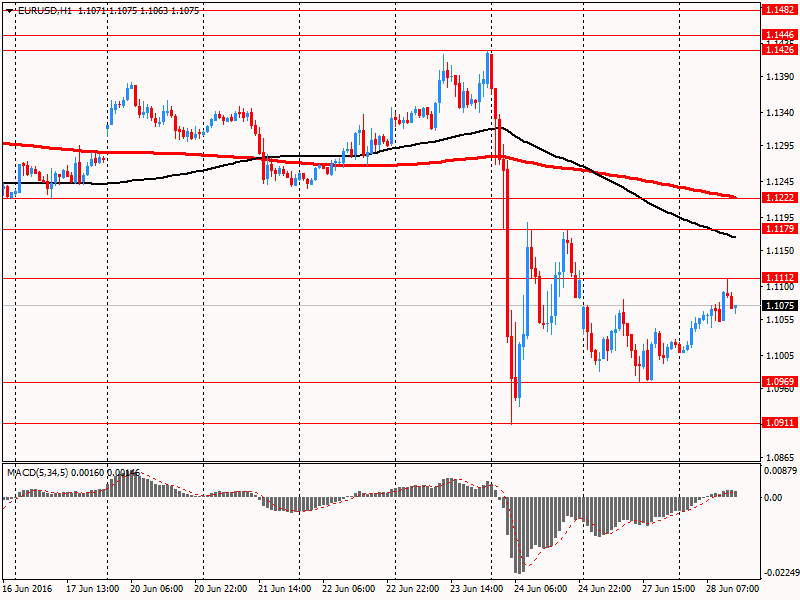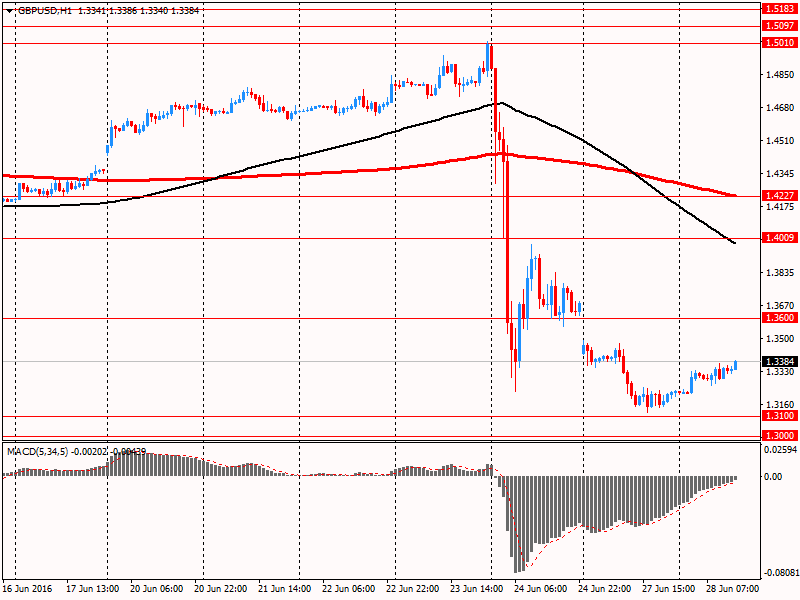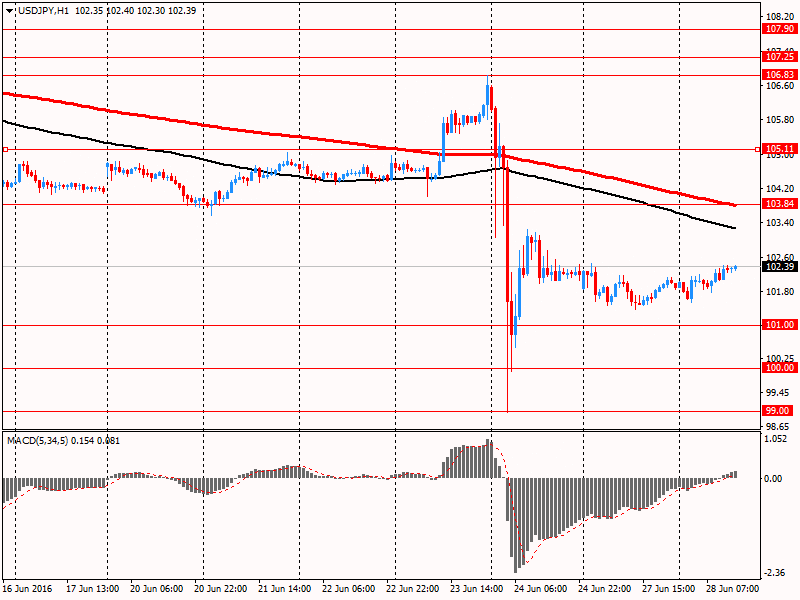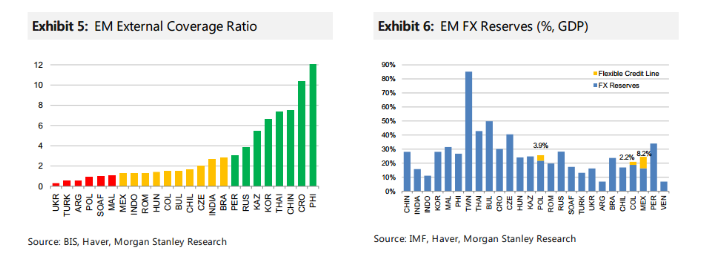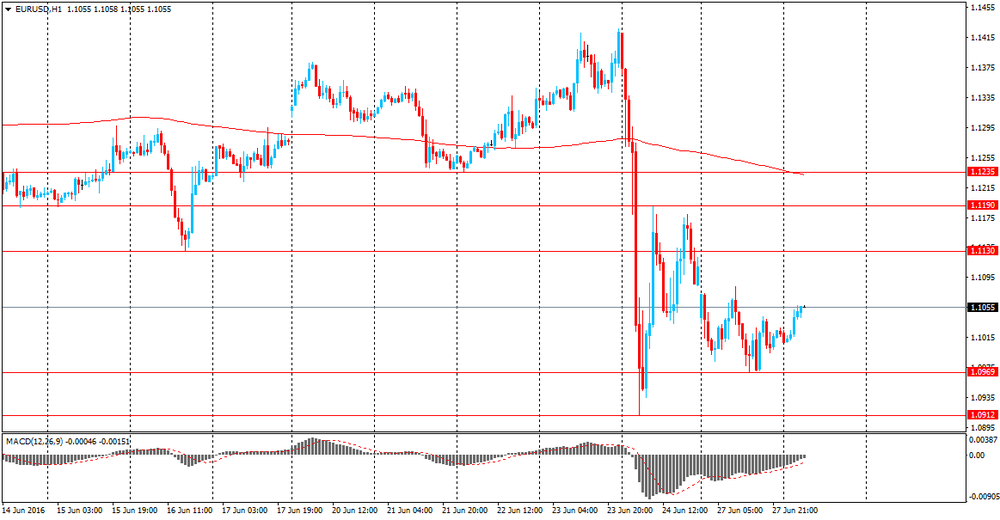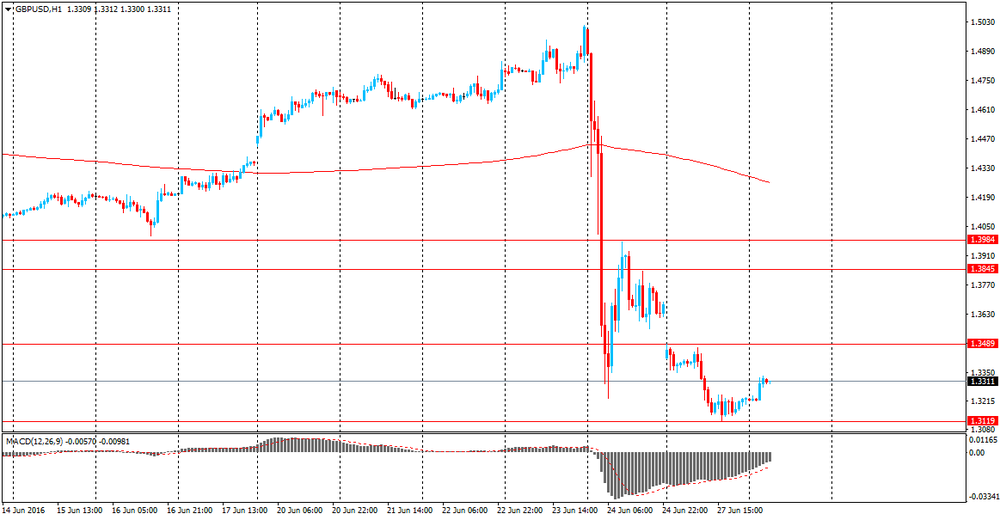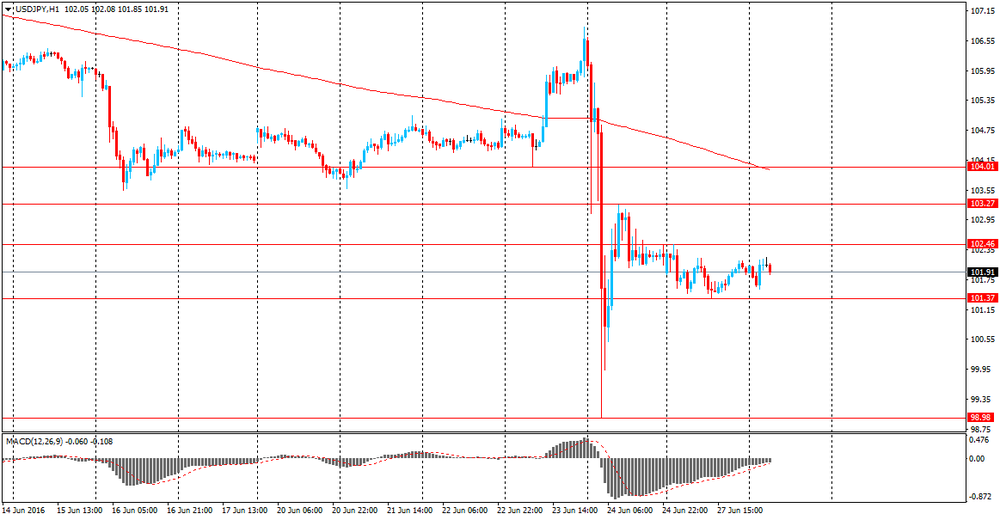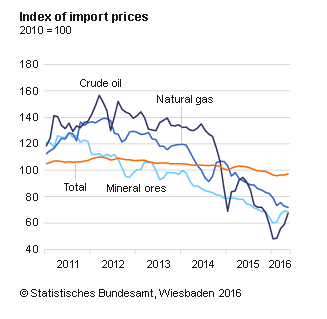Noticias del mercado
-
23:59
Schedule for today, Wednesday, Jun 29’2016:
(time / country / index / period / previous value / forecast)
01:00 Australia HIA New Home Sales, m/m May -4.7%
06:00 Switzerland UBS Consumption Indicator May 1.47
08:30 United Kingdom Net Lending to Individuals, bln May 1.6
08:30 United Kingdom Consumer credit, mln May 1287 1400
08:30 United Kingdom Mortgage Approvals May 66.25 64
09:00 Eurozone Economic sentiment index June 104.7 104.7
09:00 Eurozone Consumer Confidence (Finally) June -7 -7
09:00 Eurozone Business climate indicator June 0.26 0.26
09:00 Eurozone Industrial confidence June -3.6 -3.4
12:00 Germany CPI, m/m (Preliminary) June 0.3% 0.2%
12:00 Germany CPI, y/y (Preliminary) June 0.1% 0.4%
12:30 U.S. Personal Income, m/m May 0.4% 0.3%
12:30 U.S. Personal spending May 1% 0.4%
13:30 U.S. PCE price index ex food, energy, m/m May 0.2% 0.1%
13:30 U.S. PCE price index ex food, energy, Y/Y May 1.6%
14:00 U.S. Pending Home Sales (MoM) May 5.1% -1%
14:30 U.S. Crude Oil Inventories June -0.917
22:45 New Zealand Building Permits, m/m May 6.6%
23:05 United Kingdom Gfk Consumer Confidence June -1 -3
23:50 Japan Industrial Production (MoM) (Preliminary) May 0.5% -0.1%
23:50 Japan Industrial Production (YoY) (Preliminary) May -3.3%
-
16:12
Consumer confidence in US rose more than forecasts
The Conference Board Consumer Confidence Index, which had decreased in May, improved in June. The Index now stands at 98.0 (1985=100), up from 92.4 in May. The Present Situation Index increased from 113.2 to 118.3, while the Expectations Index rose from 78.5 to 84.5 in June.
The monthly Consumer Confidence Survey, based on a probability-design random sample, is conducted for The Conference Board by Nielsen, a leading global provider of information and analytics around what consumers buy and watch. The cutoff date for the preliminary results was June 16.
"Consumer confidence rebounded in June, after declining in May," said Lynn Franco, Director of Economic Indicators at The Conference Board. "Consumers were less negative about current business and labor market conditions, but only moderately more positive, suggesting no deterioration in economic conditions, but no strengthening either. Expectations regarding business and labor market conditions, as well as personal income prospects, improved moderately. Overall, consumers remain cautiously optimistic about economic growth in the short-term."
Less important economic data in the current post-Brexit environment.
-
16:07
Richmond’s manufacturing sector lost momentum in June
Fifth District manufacturing activity weakened in June, according to the most recent survey by the Federal Reserve Bank of Richmond. New orders and shipments declined this month, while backlogs decreased further compared to last month.
Manufacturing employment softened, while firms continued to increase wages. Prices of raw materials rose somewhat more slowly this month and finished goods prices rose slightly faster in June, compared to last month.
Manufacturers' positive expectations faded in June. Producers anticipated mild growth in shipments and in the volume of new orders in the next six months.
Compared to last month's outlook, backlogs and capacity utilization were expected to level off. Firms looked for vendor lead times to lengthen slightly during the six months ahead.
-
16:00
U.S.: Consumer confidence , June 98 (forecast 93.7)
-
15:59
U.S.: Richmond Fed Manufacturing Index, June -7 (forecast 2)
-
15:56
Option expiries for today's 10:00 ET NY cut
EURUSD 1.1100 (EUR 1.5bln) 1.1100 (251m)
USDJPY 104.50 (USD 750m)
AUDUSD 0.7290 (AUD 691m) 0.7350 (455m) 0.7500 (452m)
-
15:40
Eurogroup President, Dijsselbloem: Britain's new trade deal with the EU will be less favourable than as a member of EU
No surprises here. Most of the European leaders are presenting tough comments about what would happen next to the UK's status. After the markets return to normal conditions, this will be reflected in the pound's quotes.
-
15:34
US house price growth slowed slightly in April
Housing prices in 20 major US cities continued to rise in April, but slightly less than in March. This was reported in the S & P / Case-Shiller data.
According to the data, the index of housing prices, covering the entire country, increased in April by 5.0% in annual terms, which was slightly less than the March increase of 5.1%. In the meantime, the house price index for the 10 largest cities and has grown by 4.7% compared to 4.8% a month earlier.
The comparable figure for the 20-largest cities rose by 5.4% after rising 5.5% in March (revised from + 5.4%). Analysts had expected the house prices in the 20 largest cities to increase by 5.5%.
Most "hot" markets in the country continued to show double-digit price increases. The maximum increase was noted in Portland - by 12.3% y/y. A significant increase in the cost of housing has also been recorded in Seattle (+ 10.7%) and Denver (+ 9.5%).
On a monthly basis, seasonally adjusted house prices rose in April by 0.1%. The price index for the 10-largest cities rose by 0.3%, and for the 20 mega-cities index rose 0.5%. Without seasonal adjustment, the national index increased by 1.0% compared to March. Indicators for the 10 and 20 cities ose by 1.0% and 1.1% respectively.
-
15:00
U.S.: S&P/Case-Shiller Home Price Indices, y/y, April 5.4% (forecast 5.5%)
-
14:34
US: better GDP but lower prices and spending
Real gross domestic product -- the value of the goods and services produced by the nation's economy less the value of the goods and services used up in production, adjusted for price changes -- increased at an annual rate of 1.1 percent in the first quarter of 2016, according to the "third" estimate released by the Bureau of Economic Analysis. In the fourth quarter of 2015, real GDP increased 1.4 percent.
The GDP estimate released today is based on more complete source data than were available for the "second" estimate issued last month. In the second estimate, the increase in real GDP was 0.8 percent. With the third estimate for the first quarter, the general picture of economic growth remains the same; exports increased more than previously estimated.
The increase in real GDP in the first quarter reflected positive contributions from personal consumption expenditures (PCE), residential fixed investment, state and local government spending, and exports that were partly offset by negative contributions from nonresidential fixed investment, private inventory investment, and federal government spending. Imports, which are a subtraction in the calculation of GDP, decreased.
The deceleration in real GDP in the first quarter primarily reflected a deceleration in PCE, a larger decrease in nonresidential fixed investment, and a downturn in federal government spending that were partly offset by upturns in state and local government spending and exports and an acceleration in residential fixed investment.
The price index for gross domestic purchases, which measures prices paid by U.S. residents, increased 0.2 percent in the first quarter, compared with an increase of 0.4 percent in the fourth. Excluding food and energy prices, the price index for gross domestic purchases increased 1.4 percent, compared with an increase of 1.0 percent.
-
14:30
U.S.: PCE price index ex food, energy, q/q, Quarter I 2.0% (forecast 2.1%)
-
14:30
U.S.: GDP, q/q, Quarter I 1.1% (forecast 1%)
-
14:26
European session review: the pound gradually recovering after the massive fall
The euro rose against the dollar significantly, fully recovering after yesterday's decline. Investors continue to analyze the impact of the unexpected results of Brexit for the global economy and the political situation in Europe. However, restoration of confidence is seen after the initial reaction of panic and the markets realized that the consequences of Brexit may not be as bad as many had feared at first.
Meanwhile, the US dollar depreciates, as market participants price in a lower chance fo the increase in Fed's intrest rate for the foreseeable future. Currently, futures on the Fed rate indicates 18 percent chance of rate cuts at the September and November meetings. Prior to the British referendum there were zero chances of lowering rates and 52% chance of a rate hike at the September meeting.
Market participants are also waiting for news from the summit of EU leaders, during which will be discussed Britain's decision to leave the EU structure.
Little impact on price action from the economic data The Statistical Office Destatis reported that import prices in Germany fell again at the end of May, slowing the pace compared to the previous month. In addition, last fall proved slower than experts expected. According to the data, the import price index fell in May by 5.5 percent year on year, compared with a decline of 6.6 percent in April, which proved to be the biggest since October 2009. Economists expect that the prices will decrease by 5.8 percent. Excluding energy, import prices decreased by 2.7 percent. On a monthly basis, import prices rose in May by 0.9 percent, offsetting a decline of 0.1 percent in April. Analysts predicted that the prices will increase by 0.6 percent.
The British pound appreciated by about 1.2% against the US dollar, approaching $ 1.3400. Today, the UK Chancellor said that Britain will have to raise taxes and cut spending to counter the economic problems that will arise after the British voted for withdrawal from the European Union. "We have to ensure absolute safety for the people and show the country and the world that the government can work at full capacity". Osborne also said that the UK is a key to financial stability, which was broken by a vote. "We have entered into a long period of economic restructuring of the UK We will adapt to life outside the EU, and it will not be economically rosy as life within the EU." - Said Osborne.
Yesterday the rating agency S & P downgraded the credit rating of the UK from "AAA" to "AA" and stated that the vote against leaving the EU in Scotland and Northern Ireland UK aggravated constitutional problems. Another major rating agency - Fitch Ratings - also downgraded by one notch and warned about the likelihood of a sharp slowdown in economic growth due to the fact that the company will postpone investments at a later time. In addition, Fitch Ratings has revised downwards its forecast for UK economic growth for 2016 to 1.6% compared with 1.9% previously.
EUR / USD: during the European session rose to $ 1.1112
GBP / USD: during the European session rose to $ 1.3385
USD / JPY: during the European session rose to Y102.42
-
14:00
Orders
EUR/USD
Offers 1.1080-85 1.1100 1.1120-25 1.1150 1.1170 1.1200 1.1200 1.1230-40 1.1280 1.1300
Bids 1.1025-30 1.1000 1.0975-80 1.0930 1.0900 1.0885 1.0850 1.0820-251.0800
GBP/USD
Offers 1.3320 1.3335 1.3350 1.3385-90 1.3400 1.3430 1.3450 1.3475-80 1.3500 1.3550 1.3580 1.3600
Bids 1.3280 1.3255-60 1.3230 1.3200 1.3170 1.3150 1.3100 1.3080 1.3050 1.3000
EUR/GBP
Offers 0.8330-35 0.8350 0.8370-75 0.8400 0.8465 0.8500
Bids 0.8285 0.8270 0.8250 0.8200-0.8195 0.8165 0.8150 0 0.8130 0.8100
EUR/JPY
Offers 113.00 113.20-25 113.50-55 114.00 114.30 114.50 115.00
Bids 112.50 112.30-35 112.00 111.70 111.50 111.00 110.60 110.00 109.50 109.00
USD/JPY
Offers 102.20-25 102.50 102.80-85 103.00 103.25 103.50 103.85 104.00
Bids 101.80 101.65 1101.50 101.20-25 100.65 100.00 99.85 99.50 99.00
AUD/USD
Offers 0.7420-25 0.7450-55 0.7485 0.7500 0.7520 0.7550 0.7570 0.7600
Bids 0.7380 0.7350-55 0.7320 0.7300 0.7285 0.7265 0.7230 0.7200
-
13:00
Fitch: latest Spanish election may reduce political risk but uncertainty remains
-
Sunday's outcome is less likely to result in a repeat of 6-month political stalemate that followed that in Dec 2015.
-
signs that a high level of consumer confidence may have reduced Brexit -related falls in fin markets represent key downside risk.
-
further period of political stalemate likely to have more negative impact on confidence and growth than after December's election.
-
-
12:05
UK, CBI: weak retail sales growth
The survey, undertaken before the EU referendum, showed that orders placed on suppliers fell over the year at a somewhat slower pace than in the previous month. Sales growth is expected to pick up next month, but orders are expected to continue falling although at a slightly slower pace. Growth in the volume of internet sales slowed in the year to June, with the survey balance falling below the long-run average. However, internet sales growth is set to pick up strongly in July
-
12:03
CASS: China's GDP will grow this year by 6.6%
According to estimates from the Chinese Academy of Social Sciences (CASS), at the end of this year, China's economy will expand by 6.6%, but in the second half of the year the economy will need to rely on the support of monetary policy to counter the downward pressure. Recall that in May CASS analysts had forecast GDP growth of 6.6% to 6.8% this year.
"Consumer price inflation is likely to increase by 2% y/y, while the decline in producer prices slowed down. According to our calculations, in the first five months of this year inflation will rose to 2.1 percent, costs will be stable, but money supply growth will slow down in investment in fixed assets and real estate. " CASS also said that China should deepen economic reforms and restructuring, optimize the leverage levels.
-
12:00
United Kingdom: CBI retail sales volume balance, June 4 (forecast 9)
-
11:07
French consumer confidence fell in June
The index of consumer confidence, reflecting consumer sentiment in France dropped to 97 from the previous value of 98, and coincided with the forecast. In May the index touched the highest value since October 2007. The consumer confidence index shows the general state of the economy in the short term. However, recently there has been a downward trend, which is negative for the euro as the indicator moved further away from its long-term average of 100.
As can be seen from this figure, consumers are less optimistic about their financial prospects and the possibility to make large purchases. This economic data shown the activity before Brexit.
-
11:00
Option expiries for today's 10:00 ET NY cut
EUR/USD 1.1100 (EUR 1.5bln) 1.1100 (251m)
USD/JPY 104.50 (USD 750m)
AUD/USD 0.7290 (AUD 691m) 0.7350 (455m) 0.7500 (452m)
-
10:30
ECB, Draghi: monetary policy has inevitably created destabilising spill-overs
-
we would all clearly benefit from enhanced understanding between CBs
-
global economy can benefit from alignment of policies
-
we may not need formal coordination of policies but we can benefit from more alignment
-
monetary policy has inevitably created destabilising spill-overs as well
-
divergent monetary policy can create uncertainty about future policy intentions that can lead to higher FX volatility and risk premia
-
-
10:05
Review of financial and economic press: Standard & Poor's downgraded the credit rating of UK
D / W
Germany's finance minister: Brexit is a permanent decision
After the decision to withdraw from the European Union there is no turning back siad the German Finance Minister Wolfgang Schäuble. "I do not think that this decision is reversible", - the politician said. "There is a feeling that the British themselves repent, but it is useless - they should have thought of that before," - said Schäuble. The Minister also expressed the hope that London will soon transmit the formal request to withdraw from the EU, the so-called Brexit.
Standard & Poor's downgraded the credit rating of the UK
International rating Standard & Poor's downgraded the credit rating of the UK on Monday, June 27th. The maximum AAA rating was lowered to AA as a consequence of the outcome of the referendum on the withdrawal of Great Britain from the EU, but economists do not exclude the possibility that it could fall even lower. "In our opinion, this is a landmark event that will lead to less predictable, less stable and less effective policy framework in the UK", - said in a statement the agency. The negative outlook reflects the economic risks and the future of the pound sterling as a reserve currency, the expert said.
EU expect formal Brexit
In Berlin was held a meeting with German Chancellor Angela Merkel, the President of France Francois Hollande and Italian Prime Minister Matteo Renzi. The leaders discussed the future of the European Union following the decision of the British withdrawal from the EU.
newspaper. ru
Total will develop the largest oil field in Qatar
The French oil company Total has been selected to develop the largest oil field in Qatar, Bloomberg writes. It is noted that Total has won a 30% stake in partnership with Qatar Petroleum. The two companies will create a new company, North Oil Co. for Shaheen field development in the next 25 years.
TransCanada filed a lawsuit against the Obama administration for $ 15 billion
The energy company TransCanada filed a lawsuit against the US government claiming $ 15 billion due to the fact that the US authorities blocked the construction of the Keystone XL oil pipeline under the North American Free Trade Agreement (NAFTA), writes The Daily Caller.
US rely on negotiations for a free trade issue after Brexit
The White House is counting on the completion of negotiations on a Transatlantic Free Trade Area (TTIP) said White House spokesman Eric Schultz. He noted that negotiations with the United Kingdom will be held separately, but not with a clean slate.
Cameron: Scotland will retain access to the markets of the UK and EU
British Prime Minister David Cameron said that Scotland will retain access to both the British and the European market after Brexit, according to RIA "Novosti".
RBC
Bank of China lowered the yuan to the lowest levels in five and a half years
Bank of China lowered the RMB exchange rate to its lowest level in the last five and a half years, Reuters reports, in early trading China's central bank set the yuan's exchange rate to the level of 6.6528 dollars, which was the lowest level since December 2010.
Volkswagen will send $ 15 billion to settle "diesel scandal"
Volkswagen will provide $15 bln for the settlement of the "diesel scandal", according to Reuters, citing two sources familiar with the situation. Slightly more than $ 10 billion will be allocated to owners of cars on the buy-back system, another $ 5 billion will be sent to a special fund created to compensate for the emissions consequences. Representatives of the US and Volkswagen declined to comment.
-
09:06
Today’s events:
- at 08:00 GMT The European Parliament will vote for the resolution on the referendum in the United Kingdom and ECB President Mario Draghi will deliver a speech.
- at 08:30 GMT the ECB board member Benoit Kerra will deliver a speech.
- at 11:00 GMT the ECB Board Member Peter Prat makes a speech.
- at the 23:00 GMT FOMC member Jerome Powell will deliver a speech.
-
09:02
Fade Any Near-Term Stabilisation Effort - Morgan Stanley
"The vote to leave the EU has already and unsurprisingly prompted a significant market reaction, with the USD and JPY strengthening significantly, and GBP and EM currencies weakening substantially. While the risk of a policy response at multiple levels to stabilise markets is high, and has already led to a modest reversal of early losses, we believe the medium-term implications for growth, cross-border capital flows and risk taking more broadly mean that we are likely to see further USD and JPY strength and GBP, EM and commodity market weakness. As such, we would recommend fading any near-term stabilisation efforts.
Pressure points: We see a number of pressure points that are likely to lead to further volatility in currency markets, with more USD and JPY strength and weakness in EM currencies.
First, the initial move lower in GBP, EUR, and other major and EM currencies has of course resulted in significant USD strength. This will likely create a self-reinforcing effect, with pressure likely to now emerge on CNY. Our RMB model suggests that the USD/CNY fixing will be 400pips higher, and this would create a second-round impact on regional peers such as KRW, TWD, THB and SGD.
Second, the market is quite likely to worry about the reverberations of this decision on the rest of Europe, with the risk that other countries may attempt to pursue a similar course of action. This could result in a tightening of financial conditions, retrenchment in the European banking sector, and a growth slowdown should concerns over a Euro breakup start to get priced back into the market. This would naturally spill over into global growth concerns.
Third, global monetary firepower to cope with another global economic downturn is relatively limited. Not only will this raise the odds of markets turning risk-negative, but it also allows for a more significant differentiation between those markets where we see scope for a monetary response and those where we do not. Economies where policy rates are still relatively elevated and there are no concerns about the currency reaction to easing are likely to see their currencies weaken. This is largely in the low-yielding Asia block, versus JPY and to some extent EUR".
-
08:45
France: Consumer confidence , June 97 (forecast 97)
-
08:34
Options levels on tuesday, June 28, 2016:
EUR/USD
Resistance levels (open interest**, contracts)
$1.1319 (1893)
$1.1238 (2861)
$1.1171 (567)
Price at time of writing this review: $1.1064
Support levels (open interest**, contracts):
$1.0998 (6099)
$1.0965 (9794)
$1.0914 (9110)
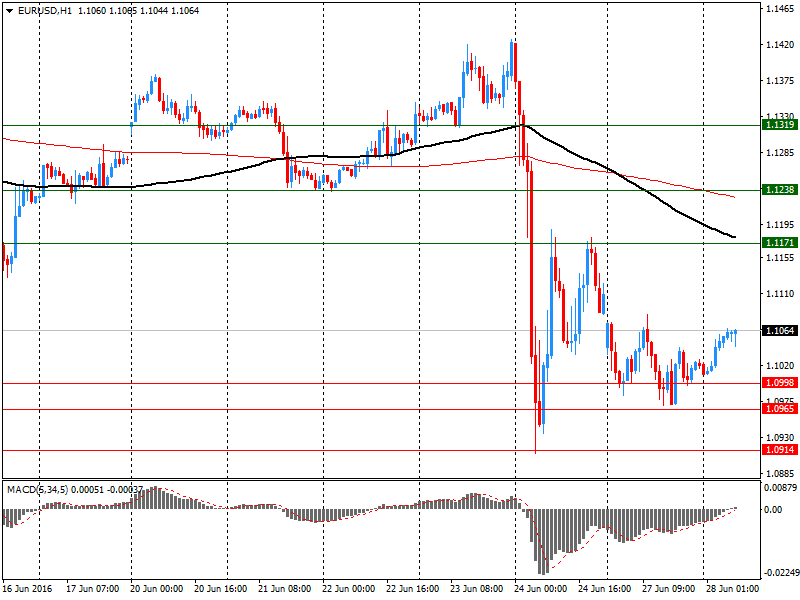
Comments:
- Overall open interest on the CALL options with the expiration date July, 8 is 39555 contracts, with the maximum number of contracts with strike price $1,1500 (5263);
- Overall open interest on the PUT options with the expiration date July, 8 is 90621 contracts, with the maximum number of contracts with strike price $1,0900 (15121);
- The ratio of PUT/CALL was 2.29 versus 2.46 from the previous trading day according to data from June, 27
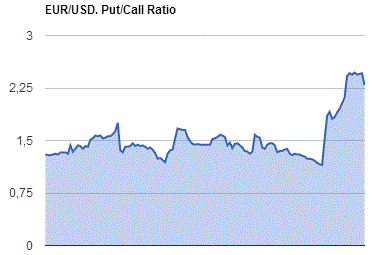
GBP/USD
Resistance levels (open interest**, contracts)
$1.3606 (310)
$1.3508 (842)
$1.3411 (91)
Price at time of writing this review: $1.3295
Support levels (open interest**, contracts):
$1.3179 (3051)
$1.3084 (413)
$1.2987 (2459)
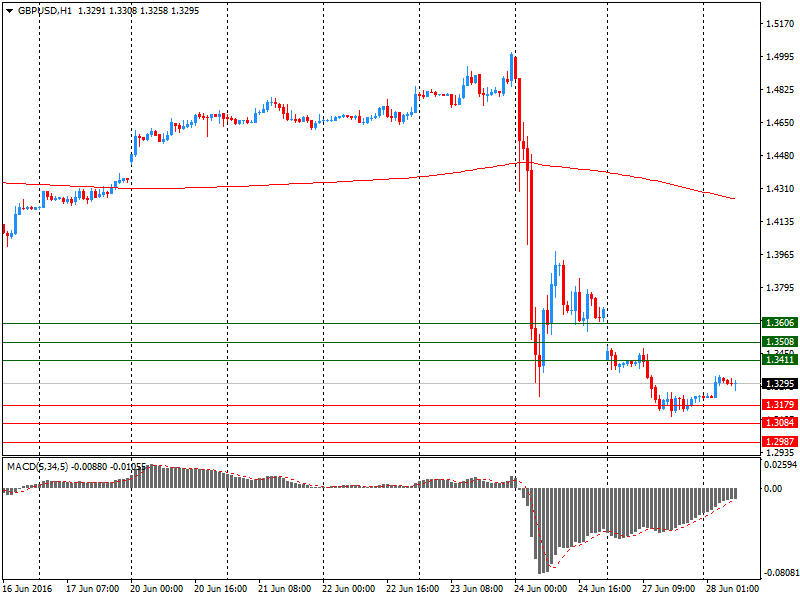
Comments:
- Overall open interest on the CALL options with the expiration date July, 8 is 27367 contracts, with the maximum number of contracts with strike price $1,5000 (4020);
- Overall open interest on the PUT options with the expiration date July, 8 is 43942 contracts, with the maximum number of contracts with strike price $1,3500 (3709);
- The ratio of PUT/CALL was 1.61 versus 1.87 from the previous trading day according to data from June, 27
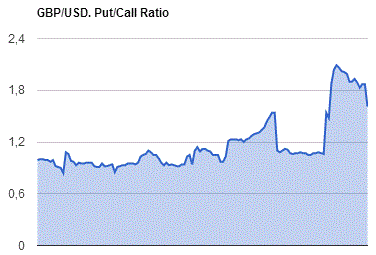
* - The Chicago Mercantile Exchange bulletin (CME) is used for the calculation.
** - Open interest takes into account the total number of option contracts that are open at the moment.
-
08:26
Asian session review: Gbp/Usd retreated from a 31-year low
Pound Sterling retreated from a 31-year low against the US dollar while the market remains concerned about the possible consequences of the UK decision to leave the European Union.
The pound touched its lowest level since mid-1985 - $ 1.3119, having fallen by 11.5% compared to the closing level on June 23.
Most economists agree that the referendum affected the economy of Britain, Europe, and possibly other countries. Some of them believe that the short-term damage can be limited, if the authorities in Britain and other countries will manage the consequences. Impact of Brexit is expected to increase due to the potential negative impact in the European economic and political landscape. "The focus right now is Europe, where Brexit can cause a domino effect among the States that wish to withdraw from the EU. The main problem for the foreign exchange market is the European political uncertainty, which could lead to monetary and credit paralysis." - Said Junichi Ishikawa, an analyst at IG Securities .
Yesterday, the pound dropped after failing to recover, despite assurances from the UK finance minister George Osborne that the fifth-largest economy in the world is able to cope with the upcoming challenges. He said that the government has a plan of action in emergency situations, which will help support the economy. However, he explained that it is not necessary to wait for the launch of new financial measures until the new prime minister will be elected, that is, until the autumn.
Today, the international rating agency Fitch downgraded the UK long-term credit rating in foreign and national currencies to "AA" from "AA +" with "negative" outlook on the background of the referendum held in the UK on 23 June.
"The uncertainty surrounding the referendum could lead to slower growth in UK GDP in the short term", - said the agency.
Fitch downgraded the outlook for GDP growth in the UK in 2016 to 1.6% from the previous value of 1.9% and to 0.9% in 2017 - 2018 from 2%.
The euro was also stable and is trading near yesterday's high against the backdrop of reviving risk appetite, which reflects the dynamics of futures on the DAX and FTSE. In addition, players take profits on short positions in anticipation of the start of the EU Economic Summit, where the main issue on the agenda may be Brexit. Accordingly, it can have a strong impact on the euro and pound.
Europe's economic calendar is empty today. The market is awaiting for US GDP data.
EUR / USD: during the Asian session, the pair was trading in the $ 1.1010-50 range.
GBP / USD: during the Asian session, the pair was trading in the $ 1.3215-85 range.
USD / JPY: during the Asian session, the pair was trading in range Y101.55-95 range.
-
08:13
Pound regains some strenght - Goldman Sachs
"The decision of the majority of the UK voters to Leave the EU changes in a fundamental way the outlook for Sterling and has economic implications which are sizable for the European economy, but less so for places like the US that are further away.
In this FX Views, we mark-to-market our forecast for the British Pound, where up until this point we had anticipated substantial appreciation against the Euro in coming years.
Our new forecast for EUR/GBP is 0.85, 0.82 and 0.78 in 3, 6 and 12 months (from 0.76, 0.74 and 0.70 before), reflecting a weaker outlook for Sterling over the coming year.
In the medium term, we think the Pound regains some strength, with EUR/GBP falling to 0.70 on a 24-month horizon (versus 0.65 in our previous forecasts) and then to 0.65 on a three-year horizon (unchanged from before). We are for now keeping our EUR/$ forecast unchanged, but as we argued in the run-up to the UK referendum, we believe the "leave" vote is a material negative shock to the Euro zone economy, which was struggling to reflate even before the recent turn of events. Our existing forecast of 1.12, 1.10 and 1.05 in 3, 6 and 12 months therefore has clear downside risk, once the near-term bid for the Euro as a result of risk aversion - for which there was clear evidence on Friday - abates. The risk is now that we reach our 24-month forecast of 0.95 and our 36-month forecast of 0.90 sooner, in particular if the doves on the ECB Governing Council shift once again to more proactive easing.
Our GBP/$ forecast, given our for now unchanged EUR/$ forecast, is therefore 1.32, 1.34 and 1.35 on a 3-, 6- and 12-month horizon, with our 24- and 36-month forecasts being 1.36 and 1.38, respectively".
-
08:05
German import prices up 0.9% in May
As reported by the Federal Statistical Office (Destatis), the index of import prices decreased by 5.5% in May 2016 compared with the corresponding month of the preceding year. In April and in March 2016 the annual rates of change were -6.6% and -5.9%, respectively. From April to May 2016 the index rose by 0.9%.
The index of import prices, excluding crude oil and mineral oil products, decreased by 3.5% compared with the level of a year earlier.
The index of export prices decreased by 1.6% in May 2016 compared with the corresponding month of the preceding year. In April and in March 2016 the annual rates of change were -2.0% and -1.6%, respectively. From April to May 2016 the index rose by 0.2%.
-
07:55
Chinese Premier Li Keqiangl: China's efforts to maintain stability in the financial market will benefit the world economy
- China will take the necessary measures to prevent sharp fluctuations in the financial market of the country.
- it is difficult to avoid short-term fluctuations in the market, but we should avoid gushing ups or sudden falls.
- as a result of Brexit volatility already occured in global financial markets.
- we must work together to prevent the spread of panic and to maintain stability in the global capital market.
-
07:52
Yield on 30-year JGB falls to record low - Reuters
The yield on 30-year Japanese government bonds struck a record low on Tuesday, as investors fretted over the fallout from Britain's vote to quit the European Union. The 30-year JGB yield fell 4.5 basis points to a record low 0.050 percent. Earlier on Tuesday, the 10-year JGB yield fell to a record low of minus 0.225 percent, and the 20-year JGB yield fell to a record low 0.040 percent.
-
00:31
Currencies. Daily history for Jun 27’2016:
(pare/closed(GMT +3)/change, %)
EUR/USD $1,1018 -0,83%
GBP/USD $1,3226 -3,42%
USD/CHF Chf0,9775 +0,48%
USD/JPY Y101,91 -0,29%
EUR/JPY Y112,28 -1,18%
GBP/JPY Y134,75 -3,63%
AUD/USD $0,7338 -1,79%
NZD/USD $0,6995 -1,92%
USD/CAD C$1,3079 +0,58%
-
00:03
Schedule for today, Tuesday, Jun 28’2016:
(time / country / index / period / previous value / forecast)
06:45 France Consumer confidence June 98 97
12:30 U.S. PCE price index ex food, energy, q/q (Finally) Quarter I 1.3% 2.1%
12:30 U.S. GDP, q/q (Finally) Quarter I 1.4% 1%
13:00 U.S. S&P/Case-Shiller Home Price Indices, y/y April 5.4% 5.5%
14:00 U.S. Richmond Fed Manufacturing Index June -1 2
14:00 U.S. Consumer confidence June 92.6 93.7
23:00 U.S. FOMC Member Jerome Powell Speaks
23:50 Japan Retail sales, y/y May -0.8% -1.6%
-
